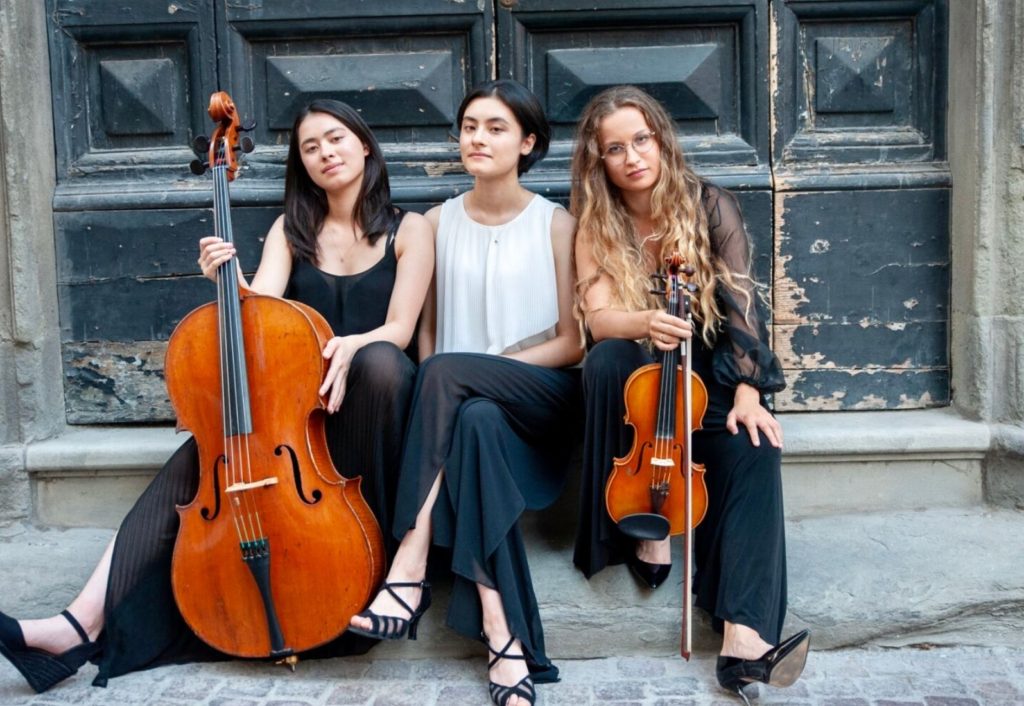Young stars Astatine Trio are ones to watch
Astatine Trio | Old Swan Hotel, Harrogate | Sunday, March 3, 11am
The award-winning Astatine Trio will make their Harrogate debut at the Old Swan Hotel on March 3, for the latest in the Sunday Series coffee morning concerts. Having only formed in 2021, the Trio are the youngest musicians in the 2024 Sunday Series and have already caught the eye of classical music fans. They won First Prize and the Luigi Boccherini Prize at the International Virtuoso & Belcanto Chamber Competition, and joint first prize at the Birmingham International Piano Chamber Music Competition in 2022. Here, Berniya Hamie, the Trio’s pianist, talks to us:
Why did you set up Astatine Trio?
Two of us are sisters (me and Riya, the cellist) and have been playing together since we were young. The trio was formed in 2021 at the Royal College of Music – we wanted to explore the rich and rewarding piano trio repertoire together and it grew from there. Being part of a trio has a very different dynamic to a duo and it’s more intimate than a quartet.
What’s the inspiration behind your name?
We always get asked this! Astatine is a rare chemical element, in fact it’s the rarest element found in the earth’s crust. We liked the sound of it and thought it was an interesting name.
What is your biggest achievement or highlight from your performance career so far?
This would probably be winning the Birmingham International Piano Chamber Music Competition in 2022. It was our first experience of a high-level international competition and was definitely nerve-wracking! It was a big step up for us and a big learning curve. But we were really pushed to bring our playing to a new level by preparing for it, which was incredibly valuable.
You’re making your Harrogate debut in the Sunday series. What are you looking forward to most?
We’re really looking forward to meeting a new audience. We haven’t really performed in this part of the UK before and we’ve heard it’s a really great concert series with a rich history.
What inspired your current programme?
We wanted to have a varied and exciting programme to showcase the diversity of the piano trio repertoire. Tailleferre’s piano trio was a real discovery for us – it’s so varied and characterful and we believe her work should be much more widely performed. The Shostakovich, Haydn and Mendelssohn trios are all classics of the repertoire and demonstrate the full range of what the piano trio can do.
What composers or musical eras do you feel most connected to, and why?
It’s difficult to pick just a couple of composers or eras, but in terms of the piano trio repertoire, Beethoven, Brahms, Mendelssohn and Schubert stand out. We also love performing contemporary repertoires. It’s something we’re passionate about because there’s a lot of great trios from the late 20th century to the modern day out there.
When did you start playing the piano and what got you into music?
My first exposure to music was playing the violin at school but that didn’t really work out. Then I asked if I could play the piano and started lessons when I was seven.
Why do you prefer classical music over other genres?
I guess there’s a bit more emotional complexity in the music. There’s a lot of great non-classical music out there, but there’s probably a wider range and also when you’re young it’s a mental challenge learning this repertoire. It keeps you engaged.
Do you have any advice for young people wanting to study music?
Try and prioritise becoming as well-rounded a musician as possible. Of course it’s important to work really hard at your instrument, but the musical world is vast and everything is connected. We would recommend developing your collaborative and chamber music skills.
A big question – what is the future of classical music? Recent research shows that 20% of audiences aren’t coming back. Is it a bleak future?
Classical music is definitely facing a challenging period at the moment, but we feel it still plays an important role in many people’s lives. Educational and outreach work is vital, as attracting younger audiences will be key for its future. For the most part, children engage really well with classical music when exposed to it in the right way, but it’s unfortunate that music is no longer a core part of school curriculums. It’s also important to explore ways of presenting classical music in different settings, away from traditional concert halls and venues. We think we’ve started to see some more young people attending concerts at the major London venues though, so hopefully progress is gradually being made!
How do you hope the audience in Harrogate responds to your music?
Hopefully they come away with a sense of what the music is about and I also hope they have a great emotional experience.


